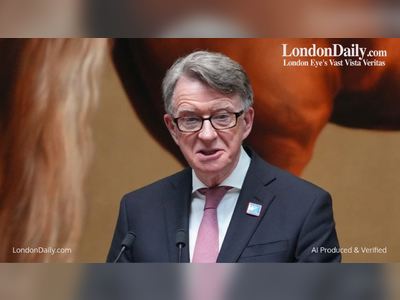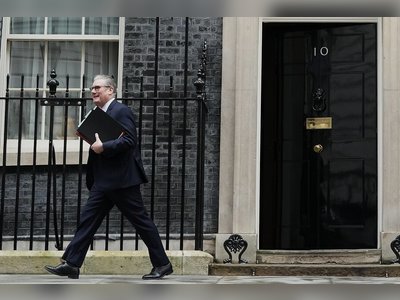
The Evolution of Trump’s Threat to America
In folklore and rhetoric, there’s a concept known as the “rule of three.” A trio of events, characters or ideas, the reasoning goes, is for some reason more engaging to the human mind than collections of two or four. The major crises that will define Donald Trump’s attacks on democracy and the rule of law over the course of his presidency have now reached that crucial number. First, there was the Russian election interference in 2016 and Trump’s efforts to overturn the investigation into it; second, Trump’s extortion of Ukraine in 2019, which led to his first impeachment; and finally, his incitement of a violent mob against the Capitol on January 6. From a storyteller’s perspective, the arc of Trump’s presidency is finally complete.
The crises share certain common elements. In each instance, Trump worked to cheat in an election and then turned the power of the presidency against those who resisted his wrongdoing or worked to uncover it. But as with any good story, there’s also a narrative trajectory. As Trump’s presidency progressed from a battle over Russian election interference to his subsequent efforts to strong-arm Ukraine into providing derogatory information on the then–presidential candidate Joe Biden during the Democratic primary, to a ploy to undermine faith in the 2020 election, his predations moved from being somewhat abstract or theoretical to startlingly concrete and proximate, even to those Americans who were at first sheltered from those abuses.
The first scandal, the one that prompted the Mueller investigation, was, on its face, about Trump’s willingness to accept election interference by the Russian government and its associates in 2016. But for Trump, the accusation carried with it the insinuation that his victory was illegitimate, and he regularly denied that this interference had any impact or that it had even happened at all. This obsession with the legitimacy of his victory led him to subvert the investigation, firing FBI Director James Comey and seeking to fire and undermine Special Counsel Robert Mueller throughout his two-year tenure.
Yet, despite the magnitude of Trump’s wrongdoing, the story remained hard to explain. Mueller’s findings were damning, but the details were complicated and the threat was difficult to conceptualize: As frustrating as it was for journalists like myself who spent years covering the investigation, the violation of election interference remained less urgent to many people than, say, the question of whether a Republican-controlled Congress would erase their health-care coverage.
As Mueller’s work wrapped up, Trump turned his attention to the 2020 election, pushing Ukraine to produce—or, perhaps, invent—information that could damage the presidential campaign of the man he saw as the biggest risk to his reelection. The nature of Trump’s wrongdoing became more concrete with the Ukraine scandal. Now the damning facts weren’t contained in a 448-page report, but on a five-page transcript of Trump’s phone call pressuring the Ukrainian president for “a favor.” But as the House of Representatives set out its case against Trump during this first impeachment, the administration’s stonewalling ensured that stubborn gaps remained in the account of what the president did and when he did it. And even those gaps aside, the danger for Americans was theoretical: Trump’s meddling could result in a scandalous story about a man who might be the presidential candidate, and if the story were to take hold, maybe that would damage Biden’s chances. The costs of Trump’s extortion of Ukraine—delaying aid to a country struggling with a Russian-backed civil war on its eastern border—were real, but they remained distant to most Americans.
And after Biden obtained the Democratic nomination despite Trump’s efforts, the president began a months-long disinformation spree aimed first at preemptively destroying public trust in the results of the presidential election and then at overturning the results of that election altogether. This time, Trump brought the bullying tactics he’d used against Ukraine home and directed them at state election officials. This time, the action was focused not in Moscow or Kyiv, but Lansing and Atlanta and, finally, Washington, D.C. And this time, the consequences were not at all theoretical, but actual, fatal violence.
Unlike the Russian interference or the Ukrainian overtures, the story of the Capitol riot is an easy one to tell. The narrative is simple: Trump told the rioters to storm the Capitol building, and then they did, and he didn’t stop them. The events didn’t require a special counsel’s office or congressional subpoenas to uncover; they were broadcast on television and live-streamed over the internet. The importance of violent rioters breaching the United States Capitol was immediately obvious. Video of senators running from a mob and police officers screaming in pain is a lot more evocative than a transcript of a call.
“He has to pay for this,” said one woman contacted by The New York Times as part of a survey on how Americans were understanding the second impeachment. “The last one, wasn’t it a phone call to Ukraine, or whatever? The Democrats, they didn’t get the whole picture the last time. … But this time, I’m sorry, he is totally guilty.” Likewise, the CBS reporter Grace Segers, who covered both impeachments, noted on Twitter that the case presented in the second trial had more “emphasis on imagery and on emotion.” Over and over again, the House impeachment managers focused on how close the senators themselves had been to the mob.
Efforts to push for impeachment after the Mueller investigation fizzled out in part after it became clear that no Republicans would sign on to the effort following the lackluster reveal of the report. After Ukraine, only one Republican senator, Mitt Romney, voted to convict Trump during the first impeachment—and Justin Amash, the only non-Democrat who voted to impeach in the House, had recently left the Republican Party. In the second impeachment, the final tally stood at 10 House Republicans who voted to impeach and seven of their Senate colleagues who voted to convict.
Their newfound scruples are welcome. Yet it says a great deal that Republicans found those scruples only after Trump had lost the 2020 election, and that Trump’s violence had to smash right through the Capitol doors for them to consider voting to hold the president accountable. The surveillance footage of members of Congress sprinting through the halls, displayed by the House managers during the trial, is sickening—but lest we write off the first impeachment trial as a sleepy affair in comparison, it’s worth remembering that the conduct at issue in that case concerned an ongoing civil war. “Nobody in your country knows what’s happening here,” a frustrated Ukrainian soldier told an American BuzzFeed News reporter at the time. Likewise, for many Black Americans, the impunity with which the mostly white rioters tore through the Capitol drove home the disparate standards with which police have treated Black people and protesters—often with Trump’s encouragement. Neither Democrats nor Republicans, though, pushed for impeachment in response to Trump’s decision to roll out the National Guard and other federal forces in an authoritarian crackdown on Washington, D.C., and elsewhere this summer.
What drove some Republicans to finally turn on Trump, in other words, wasn’t that he and his movement had suddenly become violent. It was that the violence of Trumpism, its lack of care toward others, was suddenly directed at people who understood themselves to have been safe from him.
When Trump first took office, it was common to hear jokes casting doubt on his Americanness and suggesting some kind of nefarious indenture to Russian interests: He was “Putin’s puppet,” or his comments were “better in the original Russian.” But this humor seems to have dried up by 2021. After a rioter inspired by Trump’s rhetoric walked a Confederate flag through the halls of Congress, the notion that Trump represents some kind of foreign irritant injected into the American body politic is no longer tenable. He is, instead, the most American of demagogues—not a foreign threat, but a domestic one. As Representative Jamie Raskin, soon to lead the impeachment process, quoted Abraham Lincoln in remarks on January 6: “If destruction be our lot, we must ourselves be its author and finisher.”










